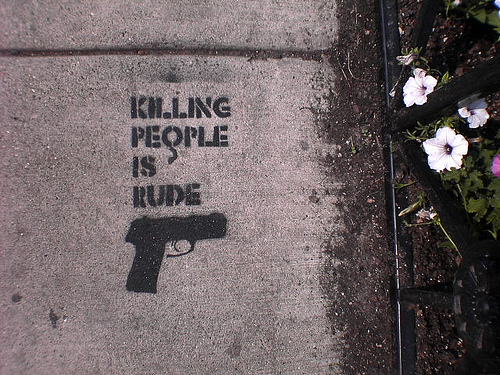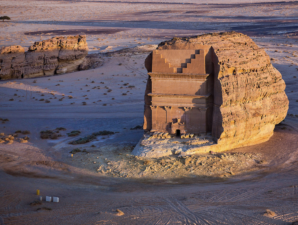 Listen up Middle East: The UN wants stronger laws for protecting land, water and wildlife during times of conflict.
Listen up Middle East: The UN wants stronger laws for protecting land, water and wildlife during times of conflict.
If the cost of human life isn’t enough for our species to understand, the UN has issued a report on enforcing the laws in place to protect the environment during conflict.
Precious desert lilies plowed over by tanks, chemicals whose potency lingers on land and in aquifers for generations after killing wildlife in one fell swoop, and marine devastation by oil spills are just some of the negative environmental effects of conflict we can expect today in the Middle East — where the old saying still applies: all’s fair in love and war.
But should it be so? Launched on November 6, what the United Nations calls the “International Day for Preventing the Exploitation of the Environment in War and Armed Conflict,” the UN says that strengthening, enforcing and clarifying existing laws protecting environment in times of conflict could go a long way towards protecting a country’s natural assets during wars.
While laws in place such as “Additional Protocol I” to the Geneva Conventions do address environmental protection, their wording remains too “stringent and imprecise” it says.
The experts from the UN recommend that greater precision could be adopted, so that the threshold for environmental damage would be defined as severe environmental impacts over several hundred square kilometers and damage that persists for a period of several months or over a season.
Other recommendations include a new legal instrument that will ‘demilitarize’ and protect important locations and economically central ecosystems such as groundwater aquifers, agricultural and grazing lands, parks, national forests and habitats of endangered species.
“At the outset of any conflict, critical natural resources and areas of ecological importance would be delineated and designated as ‘demilitarized zones” says the report, Protecting the Environment during Armed Conflict: An Inventory and Analysis of International Law. You can download the UN environment report here PDF.
The report, based on the expertise of 20 leading legal specialists, also underlines pressing new legal challenges.
International law regulating warfare was developed in an era of state-to-state conflicts.
Today the overwhelming majority of conflicts are internal, meaning that many environmental provisions – weak or otherwise – are not applicable, they write.
In a message released last week, the UN Secretary-General Ban Ki-moon says: “I call on Member States to clarify and expand law on environmental protection in times of war. Existing legal instruments should be adapted to reflect the predominantly internal nature of today’s armed conflicts”.
Achim Steiner the UN Environment Programme Executive Director (who reads Green Prophet) said: “Destroying and damaging the natural assets and ecological infrastructure of a country or community should be an issue of highest humanitarian concern. The loss of freshwaters and grazing lands to croplands and forests not only leads to direct suffering, but also undermines the survival, the livelihoods and the opportunities for people to recover during and after a conflict.
“I therefore welcome this report, which is among the most comprehensive legal assessment of its kind, as well as its recommendations. I hope it will spur the international community to bring a modern perspective to bear on enforcing, clarifying and enhancing existing laws while focusing on the outstanding and emerging legal gaps linked with armed conflict,” he added.
The report calls on the UN General Assembly to request the International Law Commission to carry out a review of the existing laws relating to the environment and conflict.
A permanent UN body, perhaps under the UN General Assembly or the Security Council, to monitor violations and process compensation for environmental damage may be necessary.
The report also calls for the international community to consider strengthening the Permanent Court of Arbitration to address disputes related to environmental damage during armed conflict.
It suggests that the coming year offers an opportunity to progress these legal issues, for example during the First Review Conference of the International Criminal Court State, which will be held in Kampala, Uganda in June 2010.
“Environmental protection should be considered during the First Review Conference of the International Criminal Court Statute in 2010,” adds the report.
Strategic Foresight Group Reports on the Environmental Cost of Middle East Conflicts
Environmental Impacts of War With Gaza
Israel Defense Force Bases Pollute Land and Water
Image via theresnowayhome



9 thoughts on “United Nations Experts Demand Stronger Laws For Protecting Environment During War”
Comments are closed.